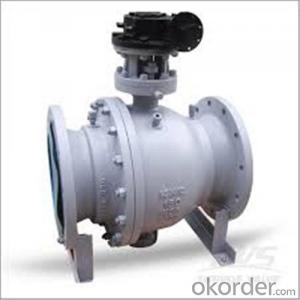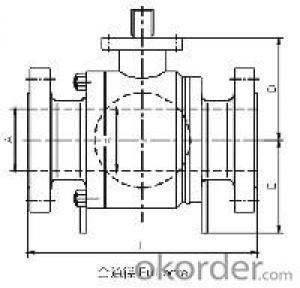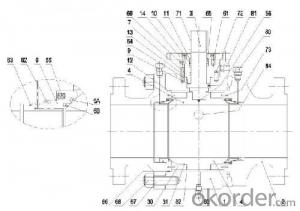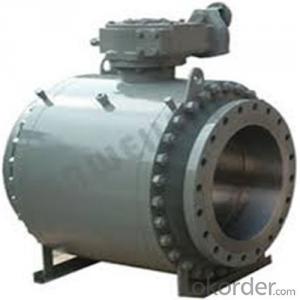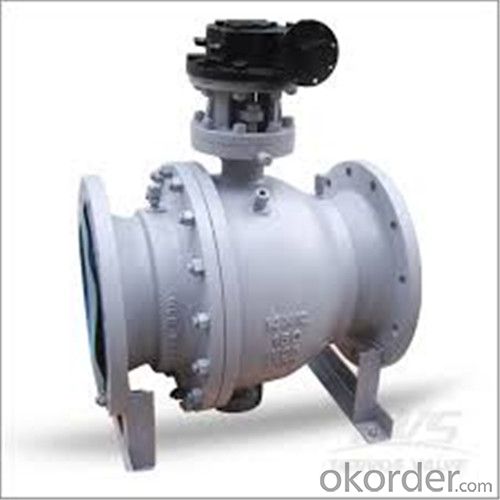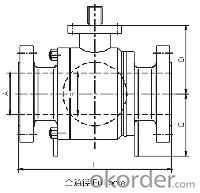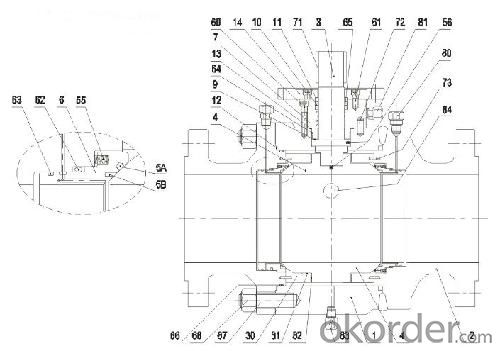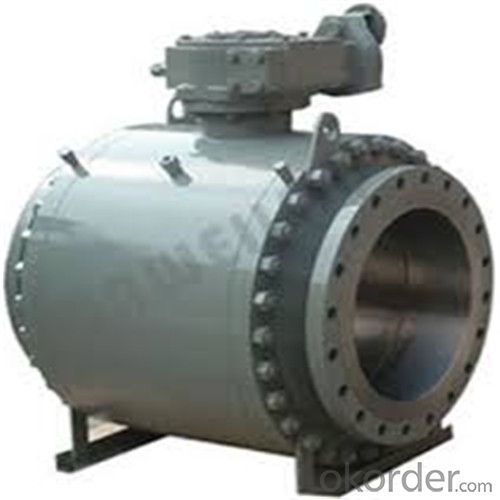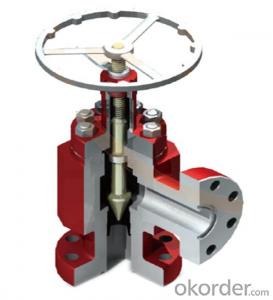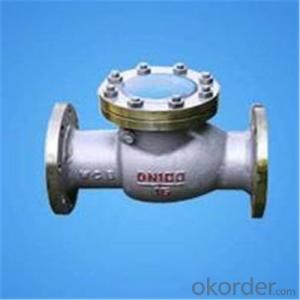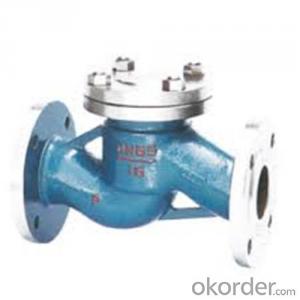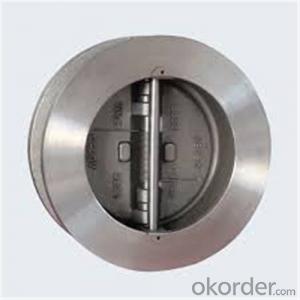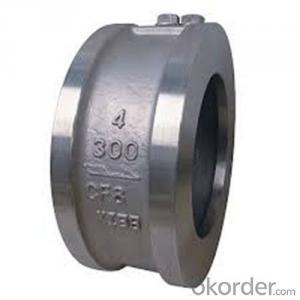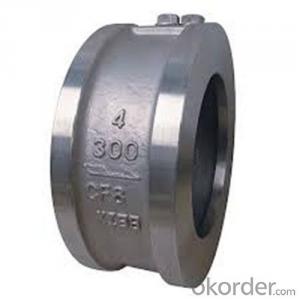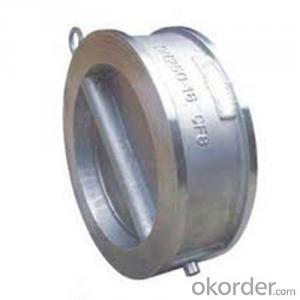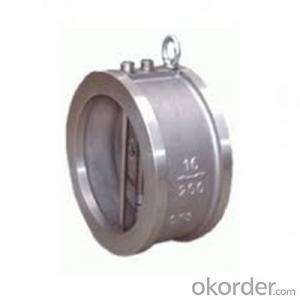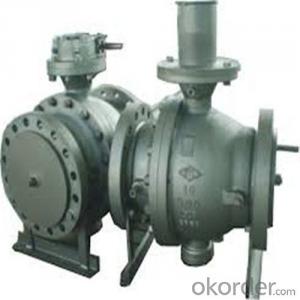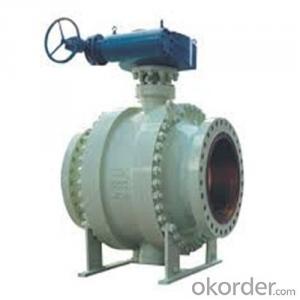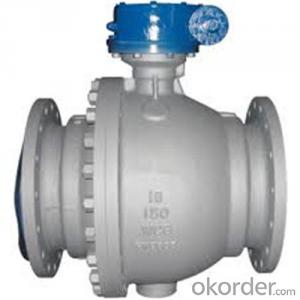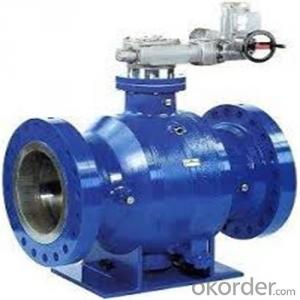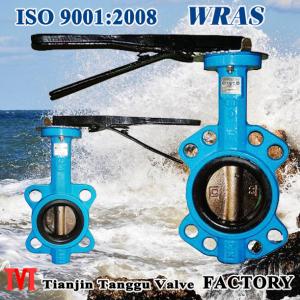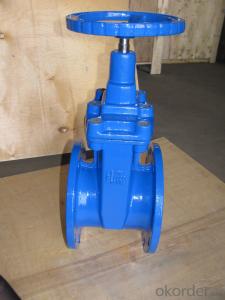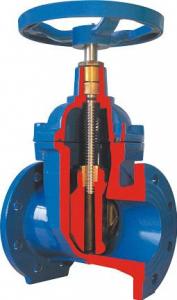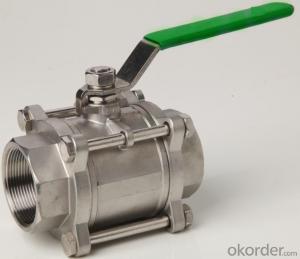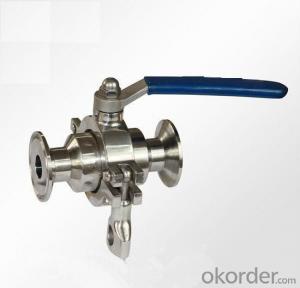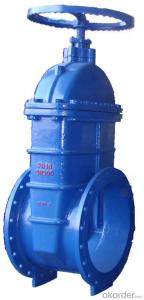High-performace pipeline ball valve PN 300 Class
- Loading Port:
- Shanghai
- Payment Terms:
- TT OR LC
- Min Order Qty:
- 10 pc
- Supply Capability:
- 100 pc/month
OKorder Service Pledge
OKorder Financial Service
You Might Also Like
Products Description of pipeline ball valve
Body of high-performance pipeline ball valve is forged structure.The connection type for body and vice-body can be BB(bolted connection)and WB(welded connection).The WB(welded connection)and the LWB(Fully-welded extended stem)structure isadopted for buried ball valves,as shown below.
High performance pipeline ball valve series has the feature of strength,high perfect sealing,maintenance-free,long life and so on.The production of this series ball valve adopts the international advanced ball valve design and manufacturing technology,selects high-quality materials in accordance with the standard selection of materials and combines with advanced materials forming forging technology.At the same time,with the years of ball valve design and manufacturing experience,the use of advanced processing and manufacturing equipment and production and processing technology,through the first-class inspection and testing equipment and instruments,perfect quality assurance management system and excellence in the production of high-performance philosophy can ensure the quality of valves.This series of valve has the performance of a high strength,defect-free forging body,excellent sealing performance,even at maximum pressure difference(full pressure),it will still be able to ensure that seal without leakage,after frequent switching action to realize a safe usage in the transportation of oil,natural gas,coal gas,and other special medium transportation pipeline.
Performance & Dimensions of pipeline ball valve
Standard Criteria | ASME/ANSI/API customize |
Pressure Rating | 1.6 Mpa 2 Mpa 5 Mpa 8 Mpa 10 Mpa 16 Mpa 25 Mpa 42 Mpa |
150 Class 300 Class 600 Class 900 Class 1500 Class 2500 Class customize | |
Valve Size | 50 mm 80 mm 100 mm 150 mm 200 mm 250 mm 300 mm 350 mm 400 mm 450 mm 500 mm 550 mm 600 mm 650 mm 700 mm 750 mm 800 mm 850 mm 900 mm 1000 mm 1050 mm 1200 mm 1400 mm |
2 inch 3 inch 4 inch 6 inch 8 inch 10 inch 12 inch 14 inch 16 inch 18 inch 20 inch 22 inch 24 inch 26 inch 28 inch 30 inch 32 inch 34 inch 36 inch 40 inch 42 inch 48 inch 56 inch customize | |
Actuator | Electric Handle Hydraulic Pilot-hydraulic Pneumatic customize |
Connection | Butt Welding Flange RF Flange RTJ customize |
Medium | Gas customize |
Medium Temperature | -29~150℃ -46~150℃ customize |
Application Fields | Electricity Petrochemical Power Station customize |
Component Materials of pipeline ball valve
1-Body Material | A105 A350-LF2-M customize |
2-Bonnet | A105 A350-LF2-M customize |
3-Stem | 4410+ENP customize |
4-Ball | A350 LF2+ENP A105+ENP customize |
5-Material of Valve Seat | fluorine rubber customize |
5-Seat | Nylon PTFE peek DEVLON customize |
6-Seat ring | A105 ENP+A322 4140 customize |
7-Packing chamber | A322 4140+ENP A105 customize |
9-Stem gasket | RPTFE customize |
10-Packing | graphite PTFE customize |
11-Packing gland | ENP+A350 LF2 ENP+A105 customize |
12-Body gasket | Stainless steel+graphite customize |
13-Gasket | Stainless steel+graphite customize |
14-Top flange | A105 A350 LF2 customize |
30-Supporting board | A105 A350 LF2 customize |
31-Gasket | customize |
55-Seat spring | B637 Inconel X750 customize |
56-Anti-static spring | B637 Inconel X750 customize |
60-Bolt | A320 L7 A193-B7 A193-B7M customize |
61-Bolt | A193-B7 A193-B7M A320 L7 customize |
62-O-ring | fluorine rubber hydrogenated nitrile butadiene rubber customize |
63-Fire-safe ring | flexible graphite customize |
64-O-ring | hydrogenated nitrile butadiene rubber fluorine rubber customize |
65-O-ring | fluorine rubber hydrogenated nitrile butadiene rubber customize |
66-O-ring | fluorine rubber hydrogenated nitrile butadiene rubber customize |
67-Bolt | A193-B7M A320 L7 A193-B7 customize |
68-Nut | A194 2HM A194 4 A194 2H customize |
71-Key | A322 4140 customize |
72-Locating pin | A322 4140 customize |
73-Locating pin | A322 4140 customize |
80-Seat injection valve | WCB+ENP customize |
81-Stem injection valve | WCB+ENP customize |
82-Bearing | PTFE+Stainless steel customize |
83-Drainage valve | Stainless steel customize |
84-Vent valve | Stainless steel customize |
85-Actuator | customize |
90-Plate | Stainless steel customize |
Standards Applied of pipeline ball valve
Design Standard | API 6D customize |
Connection Standard | ASME B 16.25-2007 ASME B 16.5 ASME B 31.4 ASME B 31.8 DIN GB、GB/T JB、JB/T JIS customize |
Test Standard | API 6D customize |
Face to Face | API 6D customize |
Pressure-temperature rating | ASME B 16.34-2004 customize |
Marking | MSS SP-25 customize |
Images of pipeline ball valve:
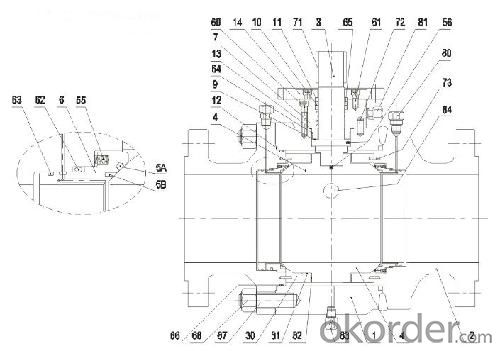
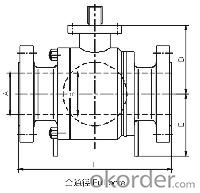
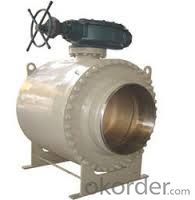
FAQ of pipeline ball valve:
Q1:I can’t find the type of steel check valve which I need. what can I do?
The chart above only lists out some common composition of steel check valve parts.We may provide other different parts material composition according to the customer's request or the actual valve working condition.
Q2:Which certification do your products pass?
Our products are in accordance with ISO 9001、ISO 14001、API 6A、API 6D、TS CE、API607/6FA/BS6755.
Q3:How can I place an order?
The only one thing you should do is to tell us the sepecification about type 、quantity and mode of transportation, then we will send you quotation within 24 hours.
- Q: We have an oil steam system. There are Dole valves - 1A on each of the radiators. We bought new ones. They don't seem to be working. They look like a bullet shape with a screw in (on the side of the bullet) to the radiator. On the top of the bullet is a slit with numbers 1-10 on a dial. A picture we saw on the web showed a plastic piece of tubing in the screw part which looks like it goes into the radiator. If we remove the valve, the radiator gets hot with steam coming out of the hole. With the new valve on, the radiator barely gets warm. We're in Piscataway, NJ 08854. H-E-L-P.
- First off these are vents , the valves are at the bottom of the radiator where the pipes come in. Sounds like the vents are either closed or broken. Try turning the adjustment screw if that doesn't work I recomend replacing the with vent from a company called ventrite the valve you are looking for is a vent rite #1. These are adjustable vents used to balance the heat throughout your unit the dial at the bottom is labeled 1-8 start with all of them on 8. Now when the radiators heat up if you find some are getting hotter faster turn those down a notch and check again in a day or so.
- Q: i'm being charged $300 to replace a 75gallon water heater valve, is that too much?
- Plumbers and service companies usually have a minimum trip charge for a service call to cover their profit and overhead for the time to drive out there and sometimes include the first hour of labor. They usually will mark up the part they install as well, sometimes 100-300% depending on how they do business. Then you have to pay the labor over what the initial trip charge covered. My plumber charges $120/hr which includes a helper, so $300 adds up real quick and may not be all that crazy of a price to pay. Also, they charge a convenience fee on holidays and weekends. If you cant do it yourself, you are stuck with paying others. Always use someone elses recommendation for plumbers, carpenters, electricians, etc. or you may get taken advantage of.
- Q: My 99 accord has been smoking bluish white smoke out of the exhaust only at high RPMS- 5000 and up, but NOT at lower RPMS. Obviously I rarely go that high, but I've feared the worst. I've checked the coolant, its green without contamination. today a mechanic discovered that someone installed the wrong pcv valve on the car- the one that belongs on the v6 model, and that it is somehow larger. the mechanic suggested it was possible that this was the cause of the smoke- the oil was getting into the intake manfold, and into the cat, and that when the engine is at higher rpms, and the gases/ heat increase, it burns up the oil in the manifold/cat. He said IF that is the cause it should clear up in a week or so. Does this sound to good to be true? or is it possible? the car does have 160,000 on it, but i've owned several hondas with much more mileage that didn't smoke at all.
- a stuck PCV valve will cause oil burning too.....so that is a good place to start.
- Q: i went to the heart doc today to get the results from an echocardiogram and he told me i had two leakages in one of the valves of my heart. i dont know why, but i didnt even bother to ask him exactly what that meant because he told me it was nothing to worry about. can anyone tell me more about this?
- What okorder /
- Q: I had the EGR valve and solenoid replaced and I'm not sure they needed to be replaced.
- they are cheap replace it
- Q: sprinkler valve leaking
- Most valves are either 3/4 or 1 with female connections. Use the same size male adaptors with teflon tape wraped around the threads and screw it into the valves. Take a photo before you start to refer to when rewiring.
- Q: the water coming out of the kitchen faucet has been getting weaker and weaker this week and now it flows a 3 out of 10. The thought it might be time to replace the faucet/faucet washer. I went to turn off the water under the sink.. hot and cold valve but water still comes out of the faucet with enough force aka not a dip but free flowing water. I turned the red handle valve to off as well but same thing. I am totally thrown off. HOt and cold water still comes out of faucet. When I push the faucet handle down, the water does not stop right away as well but slowly stops. No problem water into dish washer. I have replaced numerous faucets but I can not figure how water is still getting to the faucet after turning all 3 valves to shut off position. I still think it might be the faucet but now I am not sure. I am close to calling a plumber but really do not want to do that. thx
- Your stop and waste valves on the lines have failed. These valves have a rubber washer that turns down onto a seat to seal off flow. Often the washers deteriorate and fall away. Unfortunately you discover this at the time you need them! Shut off your main water supply and do what the first answer suggested(the debris he spoke of could be your valve washers!). If you have a chance , change the valves to ball valves which have no washers.
- Q: Hi, I'd like to control a three way solenoid valve like this one:understanding is that an electric current through the solenoid will cause the valve to let air one way while no electric current will have the air flow the other. Is there a piece of equipment like a control box (that can communicate w/ a computer) that would allow me to control the solenoid valve like this? and if so, where would i be able to find something like this....i've googled but no success. I eventually want to control the valve from a computer. Thanks
- There are dozens of valves on that link, you have to be more specific. Most valves switch between open/close with application / removal of electrical power. Restricting air flow to one direction is done via a check valve, not something that requires power. Air flow will be from the direction of higher pressure to lower pressure. A valve can stop that flow, it cannot reverse it. You can control the valve with a relay, and that with relay driver IC such as a ULN2003, and that driven by a computer. Depending on the power levels, you may be able to drive the relay directly from the relay driver. .
- Q: I have a Ford Explorer 4x4 2004 model.The check engine light soon has been on for two to three weeks, I finally got it checked and they said i need my ERG valve cleaned. They quoted it for around 50 bucks, which is fine. However, i dont get paid until a week from now. Will it be alright until then?What are the effects of a dirty/faulty ERG valve if not taken care of??There are not sputtering or anything abnormal that i can tell..Thanks.
- It will be ok to drive.It recirculates exhaust gases to help reduce emissions.Typical signs of a malfunctioning egr valve are hesitation during acceleration,rough idling,and hard starting.These can also be signs of a bad evp sensor too,which is the electrical sensor that attaches to the egr valve.The egr valve is easy to clean if you wanna do it yourself and save some cash.Remove it from its mounted location,use carb cleaner to spray inside the valve to remove the carbon buildup.You should push the pintle valve in and out so you can get cleaner to the inside passages.Be careful because you don#x27;t wanna accidentally get cleaner on the diaphragm of the valve.You can also use a small wire brush or even an old toothbrush to scrape away crusty carbon buildup.Replace the gasket if it tears during removal because a torn gasket will cause a vacuum leak.You can drive the car until you get it cleaned though,without being worried that its gonna tear something up.
- Q: My Dr placed me in the care of a cardiologist who ran some test and an echo scan reports i have a leaking valve but she failed to tell me which one and i failed to even think to ask. What are the results of leaking heart valves? I asked my mother and she says each one has a different result. What are they? Any help would be great. thanks.
- There are four valves in the human heart (Mitral valve, tricuspid valve, aortic valve and pulmonary valve). If the heart valve is leaky, the doctor can hear heart murmurs through the stethoscope. Leaky valve may cause bacterial endocarditis, heart palpitations or even heart attack. Medications will be administered for prolonged period to control the heart disease complications. Echocardiography report will clearly state which heart valve is leaking.
Send your message to us
High-performace pipeline ball valve PN 300 Class
- Loading Port:
- Shanghai
- Payment Terms:
- TT OR LC
- Min Order Qty:
- 10 pc
- Supply Capability:
- 100 pc/month
OKorder Service Pledge
OKorder Financial Service
Similar products
Hot products
Hot Searches
Related keywords
